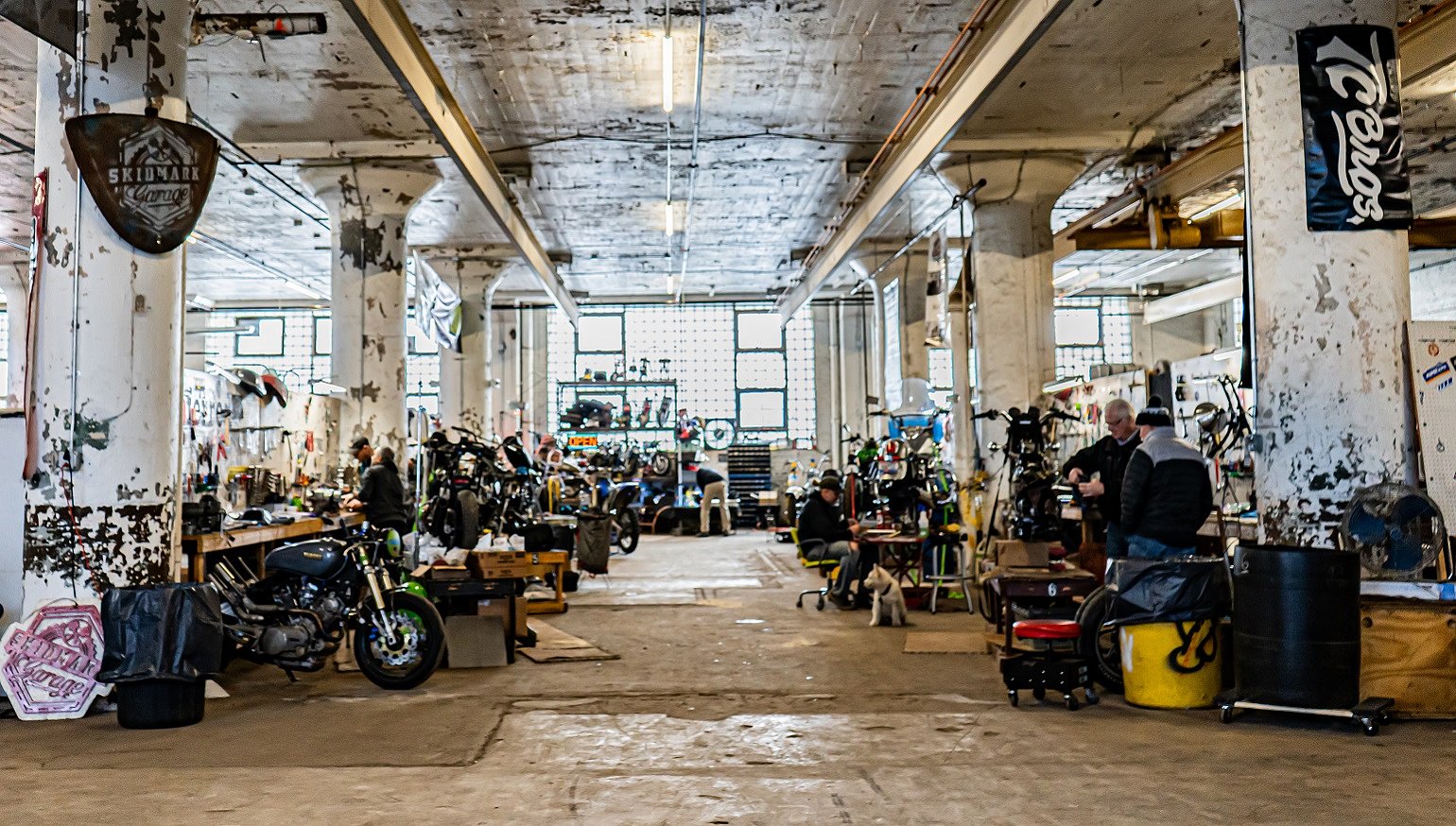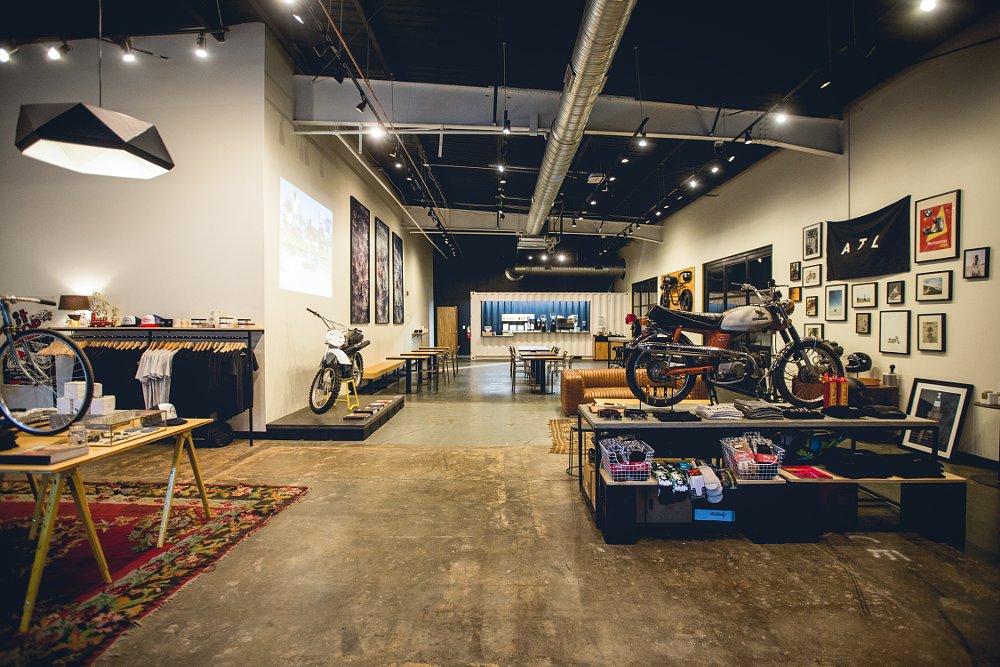When Brian Schaffran opened Skidmark Garage in Cleveland in March 2015, he thought he'd stumbled onto a lucrative business model. The return on investment hasn't been what he’d hoped — yet — but his perseverance has yielded a vibrant and inclusive motorcycle establishment and has gotten motorcycle maintenance into school curriculums, introducing hands-on skills to students, many of them girls, who had never held a tool before.
Schaffran, now 50, didn't get into riding until midlife and had no mechanical work experience before opening Skidmark. His idea to create a place where riders could learn to maintain their machines and help others in turn has evolved into an eclectic cohort of Cleveland motorcyclists — with a kickass shop space on the city’s east side. The Skidmark project also has given Schaffran, a teacher by trade, a platform from which to launch a technical education program that predominantly uses motorcycles to teach mechanical skills to students in grades seven through 12.
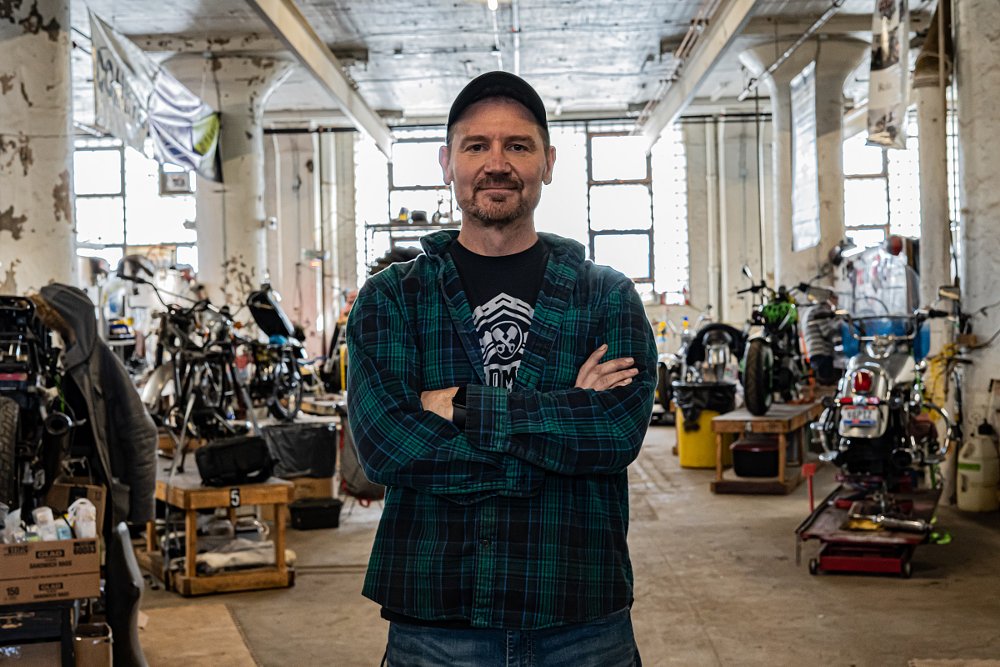
Schaffran grew up in the southwest Cleveland suburb of Strongsville in a home where motorbikes were forbidden.
"We weren't allowed to ride our cousins' minibikes or do anything like that at all," Schaffran said. "My mother thought motorcycles were the worst thing on the planet. But I do remember, as a kid, being fascinated with them."
Schaffran kept a running count of all the motorcycles he saw when he was riding in a car, which climbed into the thousands before he lost track.
He lived in the Los Angeles area for about seven years and that's when he got his first motorcycle ride.
"My roommate put me on a Honda Rebel and we rode a few miles around the valley," he said. "I loved it, and he introduced me to the vintage Hondas and other vintage Japanese bikes. They had a kind of ugly cool to them."
Schaffran first had the idea to open a community garage while living in L.A., though for four-wheeled vehicles. He didn’t have the money to act on the idea then, but he let it stew in his mind for about 20 years.
"I don’t often have fully original ideas," he said. "This felt different. It eventually became my dream."
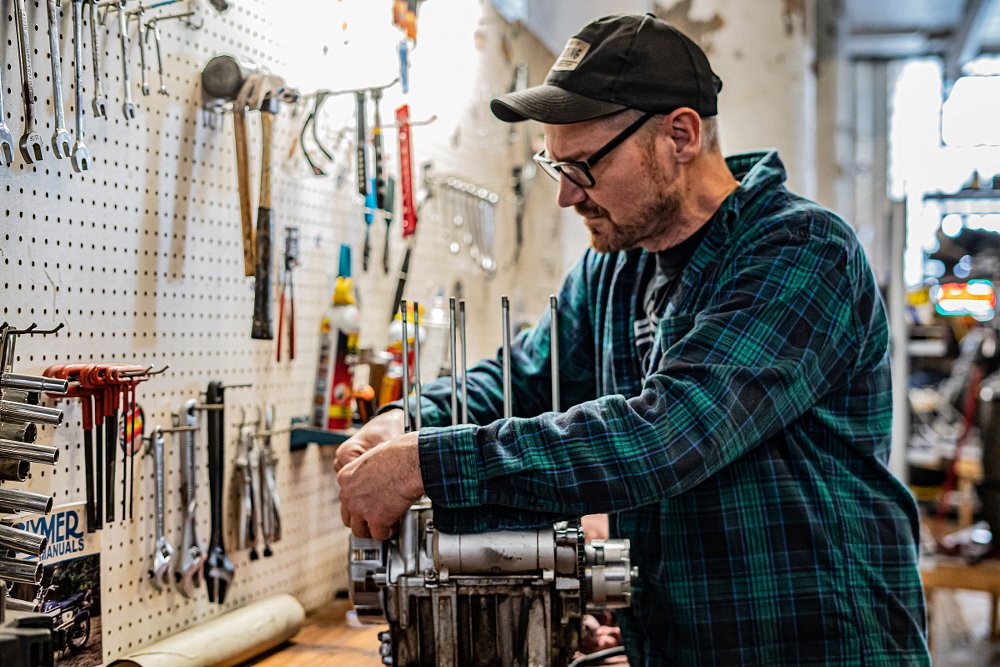
Schaffran moved back to northeast Ohio in 2000 and graduated with a degree in education from Cleveland State University in 2003. He bought his first bike in his early 30s while he was a student at Cleveland State. It was a 1978 Honda CB750 he saw on the side of the road with a "For Sale" sign on it.
Schaffran learned about his new-to-him motorcycle by tearing it down and rebuilding it several times — learning from the mistakes he made in the process. He considered the fact that the dealership that had sold his CB750 to the original owner refused to work on the bike due to its age. His experiences with the CB750 convinced him of the need for a community garage, only now he decided the concept should be aimed at motorcycle owners.
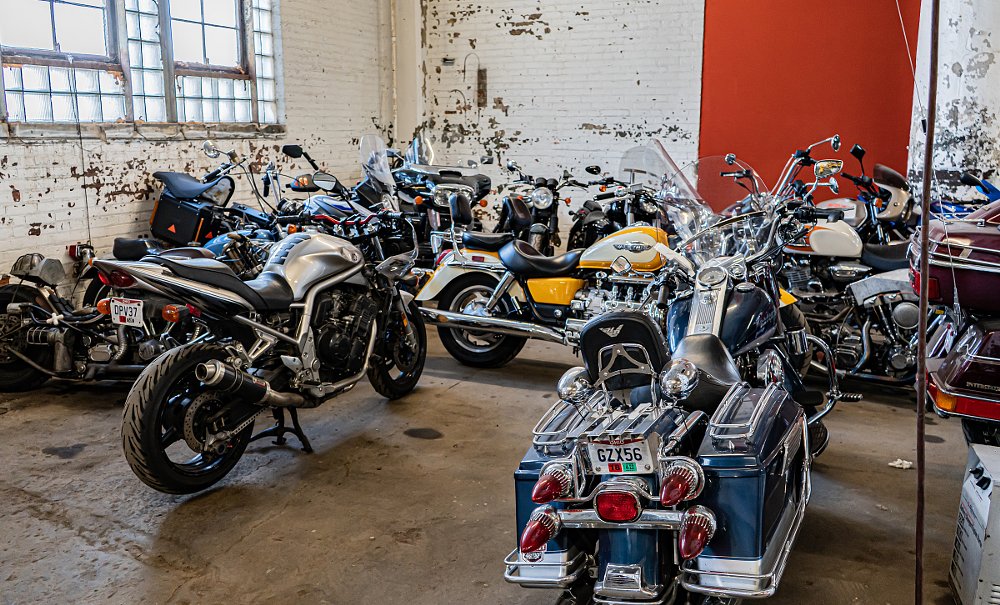
From 2003 to 2015, Schaffran taught at the Cleveland School of the Arts and Saint Martin de Porres High School, as well as working in the software industry. Others began creating community garages around the country, but they usually faced an array of challenges, from making the venture financially sound to dealing with zoning issues. Schaffran heard about one of such community garage that had opened in British Columbia, called Moto Method.
"I was bummed because I didn't do it first," Schaffran said. "They’d just gone out of business when I contacted them, but the owner was kind enough to answer a couple questions."
He said the owner also directed him to reach out to a community garage in San Diego called Cerberus. One of the owners of Cerberus, Dave Hargreaves, gave Schaffran all the advice he could ask for.
In addition to the financial and logistical challenges of getting Skidmark operational, Schaffran also had a major personal setback when his then-wife, who did not approve of the business idea, left him. Schaffran has since remarried and said his current wife, Molly Vaughan, has been invaluable to Skidmark and their other project, Motogo.
Schaffran secured his first shop space in January, 2015 and Skidmark Garage formally opened for business two months later. That first shop, located at 3619 Walton Ave. in Cleveland, was about 3,000 square feet and the lease was done on a handshake.
"Nothing was signed," he said. "I was like, 'This is the greatest! This is one of the old-school guys who does things on a handshake.'"
The space, however, left much to be desired. Holes in the roof and storm sewer backups were a constant problem.
"When it would rain really hard, water would come shooting up from the floor drains like geysers," Schaffran said. "We had to cover them with plastic bins and pile about 100 pounds of parts on top of the bins to seal them."
Once Schaffran had the garage space set to go, his next task was finding customers. He placed an ad in a local alternative newspaper and figured the demand would come quickly.
"I didn't get one phone call or e-mail or anything," he said. "I started leaving my card on people's motorcycles all around town when I saw them."
The garage's first member reached out to Schaffran to complain about a Skidmark Garage card being left on his snow-covered motorcycle in March 2015. He lived across the street from the shop and his tire change was the first work performed at Skidmark.
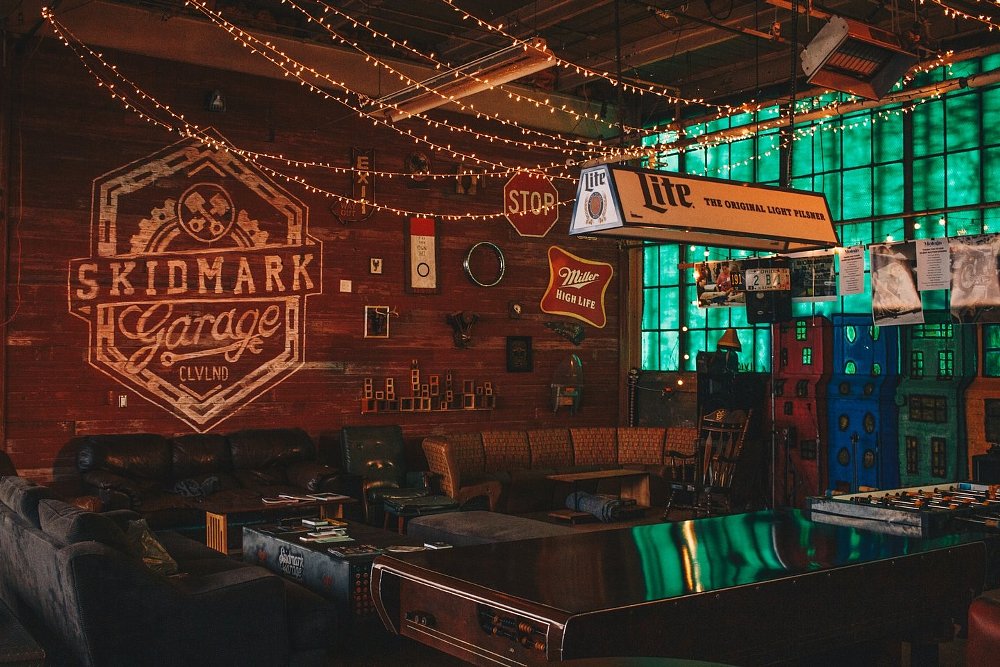
The customers eventually did come and Skidmark outgrew its first shop after about a year and a half. Skidmark moved to a 10,000-square-foot space near downtown Cleveland. That spaced served as Skidmark’s home until November 2021. He had planned to move Skidmark to a 12,000-square-foot space about a block west at 4806 Hamilton Ave. in early 2021. Delays in getting all the necessary permits, inspections and repairs postponed the move until November. He had about three weeks to get everything moved by the end of November to avoid owing rent for both shops.
"I just started doing it myself, truckload after truckload," Schaffran said. "People who even weren't members would come and help. Sometimes they'd show up in a small car and say, 'I'll take what I can in my trunk.'"
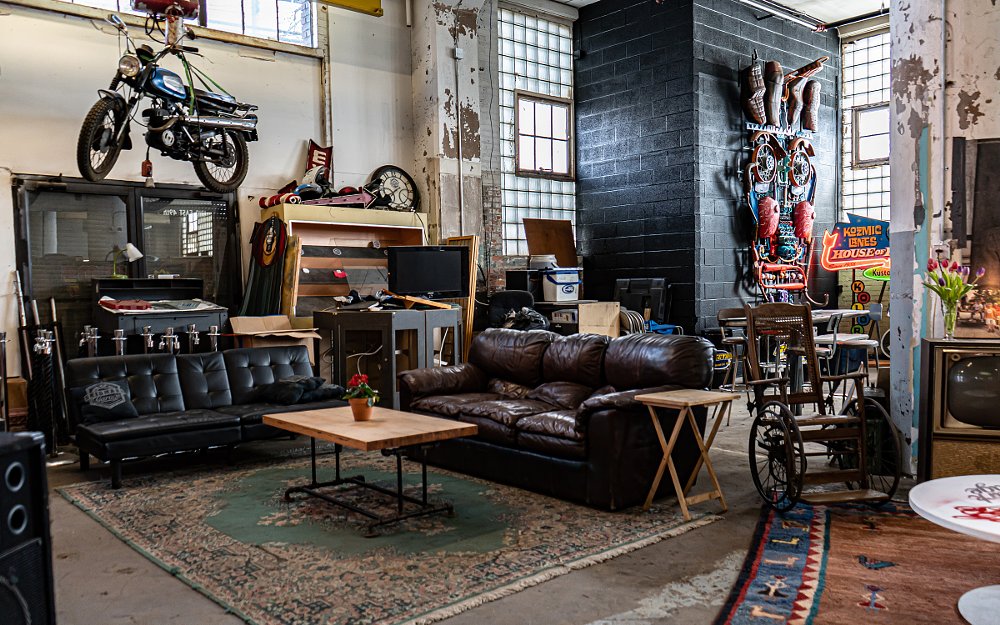
The new shop is visually stunning. Located on the first floor of a 1910s-era industrial building, it features 14 work bays, a lounge area and a wide array of tools, including large air compressors, drill presses, welding equipment and an overhead crane.
Skidmark Garage also puts on monthly seminars on motorcycle maintenance topics, such as how to change a bike's oil, carburetor care, and basic welding techniques. A Skidmark membership was initially paid by the hour for access to the shop and tools. Schaffran has added a monthly membership option, which includes access to one of Skidmark's workbenches and bike lifts, shop supplies, free wi-fi and discounts to Skidmark classes. Schaffran said he had about 50 monthly members in February 2020 before the coronavirus pandemic set in, and currently has about 30 monthly members.
Schaffran estimated that at least 100 motorcycles were being stored at Skidmark at the time of the interview, three of which belong to him. His bikes are a 1963 Honda Dream, a 1978 Honda Gold Wing and a Honda CB350.
After almost seven years of owning Skidmark Garage, Schaffran described how he's watched his business evolve in a way he didn't expect. He'd figured Skidmark's success hinged on having lots of tools, especially expensive tools many enthusiasts can't afford.

"For the most part, the tools are the second or third reason that people join," he said. "People are joining because they want the community, the camaraderie, the friendship and the knowledge and learning. That surprised the hell out of me."
Skidmark recently crossed another milestone when Schaffran hired the shop’s first employee, Greg. He’s been a member of Skidmark for a couple years and keeps a collection of minibikes at the shop. One reason he needed an employee is because of the amount of time he is spending on Motogo, his other project.
Motogo: Learning through wrenching
Motogo is a nonprofit program started by Schaffran and his wife that allows him to mix his love of motorcycles with his passion for teaching. As a high school social studies teacher, he learned that most of his students had never used any kind of hand tool, which disturbed him. The Motogo project got its start when a friend of Schaffran's was seeking help in adding some shop-style "maker" classes to a school's curriculum. Schaffran said he'd give it a try.
The Motogo nonprofit entity was formed in 2017 and the first Motogo-branded program was held in conjunction with Catholic all-girls Magnificat High School in Rocky River, Ohio. Instead of stopping the program when the pandemic hit, Schaffran shifted it into overdrive. Schaffran and his wife brainstormed ways to keep his students engaged in a remote learning setting and he remembered he had a cut-away model of a Honda CB750 engine.
"I thought, 'Wouldn’t it be cool if I could buy 100 of these and give them to kids and teach them how to put it together over Zoom?'" he said.
Though he couldn't find more of the CB750 model engines, he did procure 12 plastic models of a V8 engine. The models use LED lights for the spark plugs and have an instruction manual authored by Haynes/Clymer. That company later donated about 50 models, which Schaffran used to teach his students to build via Zoom. While most remote learning consisted of students listening to a teacher talk, Schaffran tried to keep it interactive.
"I had them angle their phone at their hands so I could see what they were doing, and they could see what my hands were doing on their laptops," he explained. He put together a studio in his attic with iPads that allowed the students to see what he was doing from lots of different angles.

Schaffran later started using Honda CB350 engines for the Motogo classes. He delivered the engines and Craftsman tool kits to students’ homes, and the kids worked on them in their families’ basements or garages for the class. When a class was done, Schaffran would pick up the tool kits and engines from the students' houses and was sometimes blown away by the positive reaction parents had to their kids' involvement in the class.
"Parents would say, 'She had so much fun doing this! She loved it! The engine was sitting in our kitchen the whole time.'"
Motogo has worked with about half a dozen schools in the Cleveland area and is setting up the program at about another half dozen. Among them is the Laurel School, which costs more than $30,000 per year to attend for grades five and up. Schaffran said Motogo was selected to be one of the school's "intensives" programs, in which students take part in all-day classes for about a week. Schaffran taught the 30-hour engine program to eight girls in a basement-level art room.
"Those girls were so into it," he said. "They tore the bikes apart and put them back together. On the last day, we brought one of the motorcycles into the parking lot and they all got to kick start it. It was unbelievable."
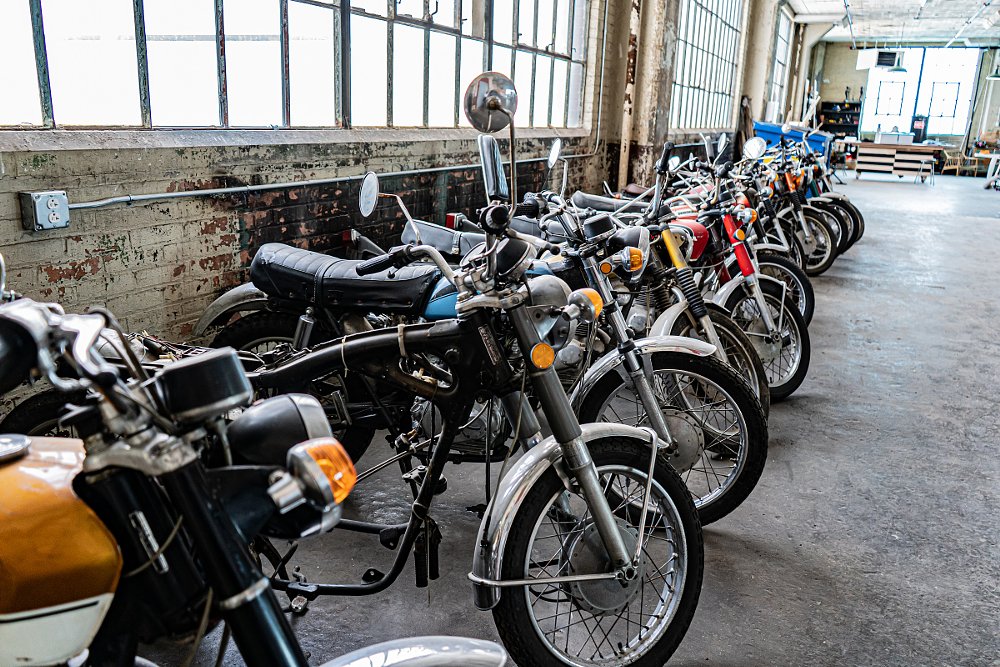
Motivated by a passion for motorcycling
Schaffran now spends about 40 hours per week running Skidmark Garage and about another 30 hours per week on Motogo. It's a demanding schedule but he says it's worthwhile.
"It's all been very exhausting, for sure," he added. "Every once in a while, I have a day when I say, 'It’s getting to be too much.' Then I think about when I wasn't working for myself. I was just as stressed."
Schaffran may be short on time, but not ideas. Though he can't start a third business, he has this idea about minibikes, kids and the future of motorcycling.
"When minibikes disappeared in the '80s and '90s, kids missed out on that experience," he said. "If we bring minibikes back, we are essentially guaranteeing motorcycling will still exist 20, 30 or even 50 years later."
He'd like to buy several acres of former industrial land near downtown Cleveland to build a minibike track. "I'd have a cinder-block garage there and teach the kids how to fix their minibikes," he said. "We'd have a stable of minibikes you could rent."
"I care about the future of motorcycling, and I think we need to start at the most grassroots thing possible: children and minibikes," he said.
Maybe for Brian Schaffran's next act.

 Membership
Membership

